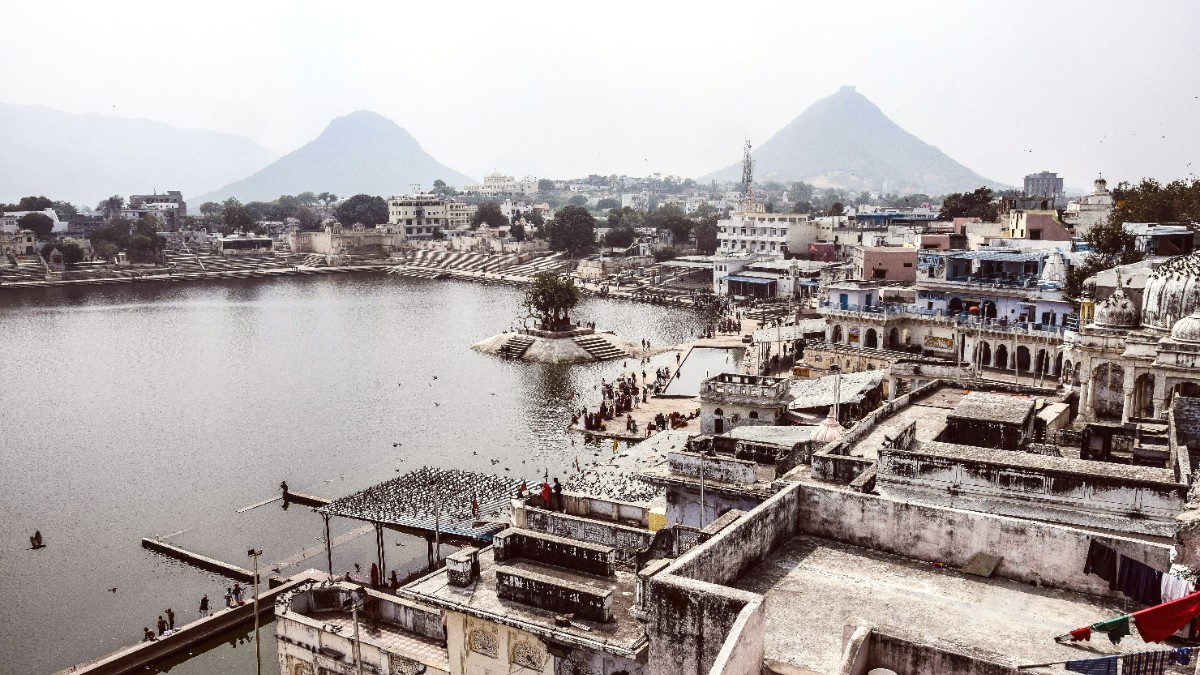
Rajasthan, India
It is a place where every corner tells a story, and every moment brings a chance to connect with India’s deep spiritual roots and colorful traditions. Prepare to discover a destination that truly captures the soul of Rajasthan.
Pushkar sits quietly in the Ajmer district of the Indian state of Rajasthan. You will find it approximately 11 to 14 kilometers (7 to 9 miles) northwest of Ajmer, a larger and more bustling city. The town has a special position, nestled in a valley that offers protection and a scenic setting. Hills rise on three sides, providing a natural boundary and a picturesque backdrop to the landscape. The fourth side opens out to the desert, linking Pushkar to the vast Thar Desert beyond.
The central feature of Pushkar's geography, and its spirit, is the sacred Pushkar Lake. This body of water is not just a geographical landmark; it is the spiritual anchor of the town, drawing pilgrims and visitors to its shores. The surrounding hills, part of the ancient Aravalli Range, contribute to Pushkar’s distinct microclimate and offer viewpoints for breathtaking panoramic sights. The town's compact nature, built around the lake, means many attractions are easily reachable on foot, encouraging exploration of its winding lanes and bustling markets. This unique geographical arrangement presents both natural beauty and a manageable scale for visitors.
Pushkar is one of India's oldest cities, holding a profound place in Hindu religious texts and traditions. It is often called "Tirth Raj," meaning "the king of pilgrimage sites," a title that highlights its deep spiritual importance. The town's fame comes mainly from two features: Pushkar Lake and the Brahma Temple.
Local belief states that Pushkar Lake appeared when Lord Brahma, the creator god in Hinduism, dropped a lotus flower to earth. This divine origin makes the lake a revered spot for holy dips and rituals. The Brahma Temple, dedicated to Lord Brahma, is another source of Pushkar's renown. It is one of the very few temples in the world dedicated specifically to Lord Brahma, making it a rare and especially sacred destination for devotees. While the temple's roots trace back thousands of years, the current structure dates from the 14th century, a testament to its enduring legacy.
Known as the "king of pilgrimage sites."
Believed to have formed from Lord Brahma's lotus flower.
One of the world's few temples dedicated to Lord Brahma.
Current Brahma Temple dates from this period.
A centuries-old livestock and cultural event.
Beyond its religious importance, Pushkar is also historically outstanding for hosting the annual Pushkar Camel Fair. This event, held around the Hindu lunar calendar month of Kartik Purnima (typically late October or early November), began centuries ago as a livestock trading fair.
Pushkar's spiritual heritage is deeply intertwined with its historical past, drawing devotees and scholars for centuries. The town is a testament to enduring faith and tradition.
The historical commerce, especially through the Camel Fair, highlights Pushkar's role as a regional trade hub, creating an unique blend of spiritual and economic significance.
This rich blend of spiritual heritage and historical commerce makes Pushkar a truly unique destination.
Pushkar presents a distinctive travel experience, blending religious reverence with a lively local atmosphere. Here is a quick look at what defines this special destination:
Pushkar is in the Ajmer District of Rajasthan, India. It connects well with major cities in Rajasthan and the larger Indian subcontinent.
The town is mainly known as a significant Hindu pilgrimage site. Its sacred lake, Pushkar Lake, is a focal point for rituals and bathing, believed to cleanse sins. The Brahma Temple, one of the world's rare temples dedicated to Lord Brahma, draws devotees from across the globe. This spiritual focus shapes much of the town's character and activities.
The annual Pushkar Camel Fair, held around Kartik Purnima (late October or early November), presents a spectacular gathering. It is not just a livestock fair but also a large cultural festival, featuring camel races, folk performances, and a bustling marketplace.
Pushkar maintains a predominantly vegetarian policy throughout its main town area. No meat or eggs are served or consumed publicly. Alcohol is also prohibited. This policy preserves the town's sanctity.